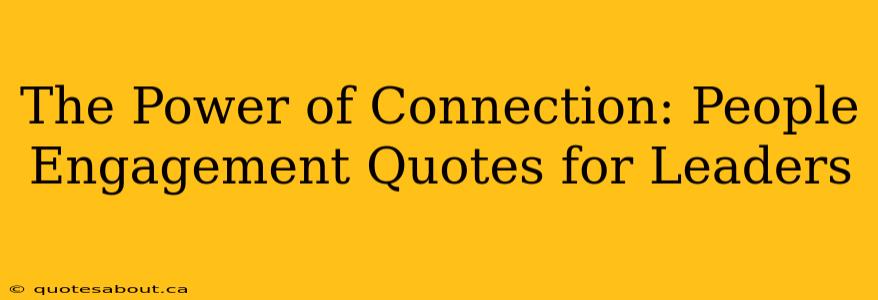In today's dynamic business landscape, leadership isn't just about strategy and execution; it's profoundly about people. Engaging your team, fostering a sense of belonging, and inspiring collaborative action are crucial for success. This article explores the power of connection through insightful quotes from influential leaders, examining how these principles translate into practical strategies for fostering high-performing, engaged teams. We'll delve into the nuances of effective communication, the importance of empathy, and the art of building strong relationships, all vital components of successful people engagement.
Why is People Engagement Important for Leaders?
Before diving into the quotes, let's establish the why. People engagement isn't just a feel-good initiative; it's a critical driver of business outcomes. Highly engaged employees are more productive, innovative, and committed to the organization's success. They're less likely to leave, resulting in lower turnover costs and increased institutional knowledge. A truly engaged workforce translates directly to a stronger bottom line.
Inspiring Quotes on People Engagement
Here are some powerful quotes that encapsulate the essence of effective people engagement:
"The key is not to prioritize what’s on your schedule, but to schedule your priorities." - Stephen Covey
This quote underscores the importance of intentionally making time for your team. Prioritizing employee interactions, providing regular feedback, and actively listening to concerns demonstrate that people are your top priority. Scheduling one-on-ones, team-building activities, and open forums all contribute to this prioritization.
"The best way to find yourself is to lose yourself in the service of others."- Mahatma Gandhi
Gandhi's words highlight the power of servant leadership. When leaders prioritize their team's needs and growth, they foster a culture of trust and mutual respect. This approach builds strong relationships and motivates employees to go the extra mile.
"Leadership is not about titles, positions, or authority. Leadership is about influence." - Unknown
True leadership stems from the influence you exert on your team. This influence isn't based on power dynamics but on inspiring trust and commitment. It's cultivated through consistent actions, open communication, and a genuine care for your team's well-being.
"The greatest leader is not necessarily the one who does the greatest things. He is the one that gets the people to do the greatest things." - Ronald Reagan
This emphasizes the importance of delegation and empowerment. Effective leaders don't micromanage; they trust their team, provide them with the resources they need, and allow them the autonomy to excel.
How to Practically Apply These Principles
Now that we've explored inspirational quotes, let's look at practical applications:
-
Open Communication: Regular, transparent communication is crucial. Establish clear channels for feedback, both upward and downward. Encourage open dialogue and create a safe space for expressing concerns.
-
Empathy and Active Listening: Truly understanding your team's perspectives, challenges, and motivations is vital. Practice active listening – truly hearing what is being said, not just waiting to respond.
-
Recognition and Appreciation: Publicly acknowledge and appreciate individual and team accomplishments. Small gestures of gratitude can go a long way in boosting morale and engagement.
-
Empowerment and Development: Provide opportunities for growth and development. Delegate responsibilities appropriately, allowing team members to take ownership and build their skills.
-
Team Building: Organize team-building activities to foster camaraderie and collaboration. These events can be formal or informal, but the goal is to create a stronger sense of community.
Addressing Common Challenges in People Engagement
What are some common obstacles to people engagement?
Common obstacles include poor communication, lack of trust, inadequate recognition, limited opportunities for growth, and a disconnect between company values and employee experiences. Addressing these issues requires proactive leadership, open communication, and a commitment to creating a positive and supportive work environment.
How can leaders overcome resistance to change within their teams regarding people engagement initiatives?
Overcoming resistance requires transparent communication, active listening, and demonstrating the benefits of the initiative. Involve team members in the process, address concerns directly, and celebrate small wins along the way. Show that people engagement is not just a management trend but a vital part of achieving organizational success.
In conclusion, the power of connection in leadership is undeniable. By embracing the principles highlighted in these quotes and implementing practical strategies, leaders can cultivate highly engaged teams, driving both individual and organizational success. Remember that building strong relationships and fostering a culture of trust are long-term investments that yield significant returns.

